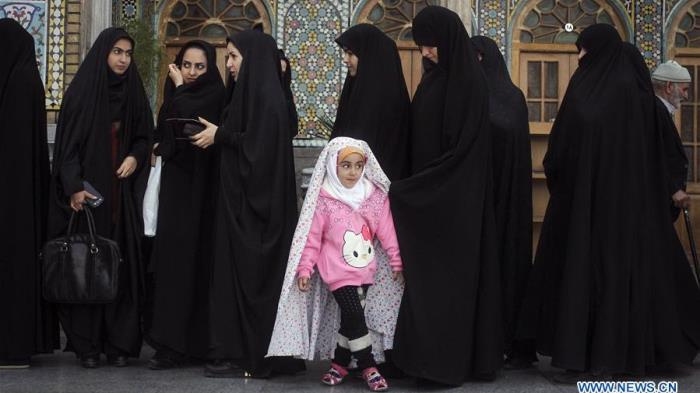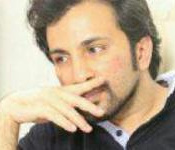Farewell Thee Bittersweet 2016!

(Picture: Young girl standing in line for parliamentary ballots of February 2016.)
The year 2016 was one of bittersweet developments, from the very beginning, galore. It now ends in a still dangling over a crossroad of hopes and fears.
It was on January 2, 2016, that an assault on the Saudi diplomatic mission in Tehran by a group of vigilantes enraged by Saudi Arabia’s execution of prominent Shiite cleric Sheikh Nimr al-Nimr launched a domino, in which several Arab states cut diplomatic ties with Iran. The cessation of Iran-Arab ties and the Mina stampede in 2015 were among the main reasons Iran has boycotted haj, a mandatory pilgrimage ritual for all Muslims.
Attention to increased regional tensions between Iran and its regional rivals was soon diverted, as within a fortnight came the much-awaited Implementation Day for a landmark nuclear deal (dubbed the Joint Comprehensive Plan of Action/JCPOA) between Iran and six world powers, meant to lift nuclear-related sanctions on Iran in return for the country’s commitment to assure the powers of its nuclear program’s exclusively peaceful intensions. With the deal came promises for Iran’s economy to be able to make a comeback to the global system. Decision-making economic institutions loosened their grip on Iran. A one-year suspension from FATF anti-money laundry blacklist and the reconnection to SWIFT have been scored since the Implementation Day. In spite of banking problems, caused by major international banks’ reluctance to work with Iran in fear of penalties, Iran has started efforts to pump and export oil and to take back its market share before the sanctions were exposed. Deals were made with giant manufacturers Airbus and Boeing to renew Iran’s aging air fleet in a bid to boost flight safety, commercial ties, and the country’s tourism industry.
Iran’s domestic scene was also shaken up with sweeping disqualification of pro-reform candidates who ran for parliamentary and Assembly of Experts elections, slated for February 26. The Guardian Council’s vetting process also bulldozed Hassan Khomeini, a grandson of the founder of the Islamic Republic and its first Supreme Leader Ayatollah Ruhollah Khomeini over lack of expertise in fiqh, Islamic jurisprudence. The results of the twin elections turned into a controversy in which both umbrella parties in Iran claimed victory. It was only months later that the sides admitted the diversity in the lineup of the parliament, even though a reformist-moderate coalition still eyed to undo the unprecedented post-election disqualification of Isfahan candidate Minoo Khaleghi, who was barred from Majlis.
Even though a rapprochement with the US still seems unlikely, Iran has seen some previously severed or waning ties rewielded too. The country is now engaged in human rights talks with the European Union. It has also upgraded its ties back to ambassador level with the United Kingdom, amid a background of positive signals from the likes of Canada to reopen embassies.
Apart from the nuclear dossier, Iran landed a few major wins in the region as 2016 approached its end. In November, the election to Lebanon’s presidency of Michel Aoun, a close Hezbollah ally, after a long political deadline was hailed as a major victory for Tehran, vis-à-vis Saudi Arabia. Iran’s exemption from oil cuts agreed by OPEC and later even non-OPEC members was another push for Iran’s return, in the face of sabotage by rivals. The last but definitely not the least achievement of great regional outcomes for Iran was the liberation of Aleppo, a further milestone in resolving the Syrian crisis.
Iran will hold yet another major election in May to decide who holds office in the next four-year presidential term. Even though the Supreme Leader’s advisory veto of a likely Ahmadinejad campaign, in what many hope to be the last nail in the coffin of the Principlist camp’s hope for the race, the upset victory of an impossible presidential candidate on the other side of the planet has raised eyebrows among pro-Rouhani circles, too. Donald Trump’s presidency could jeopardize the future of the nuclear deal, many believe, snapping back Iran into the sanctions era of economic, not to mention political, isolation. Trump has criticized the Democrats-backed deal several times during his campaigns. Most of his cabinet members are also on the same page. Nonetheless, Trump’s administration-to-be has revealed little about its Iran approach yet. Trump recently labeled the deal a ‘horrible’ one, outraged by a UN resolution that condemned Israeli settlements, believing both developments harmed ‘great’ friendship between Israel and the US. Will he try to renegotiate the deal, as he has suggested? What will it incur for Iran?


